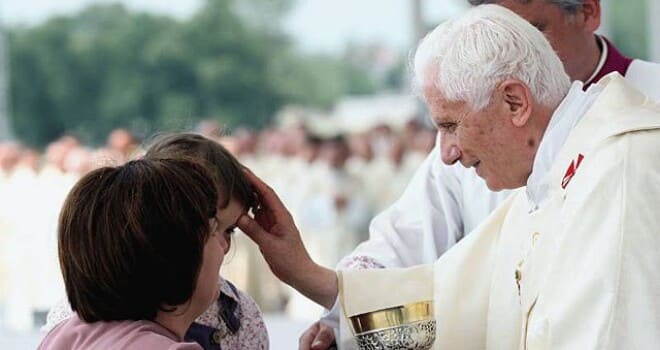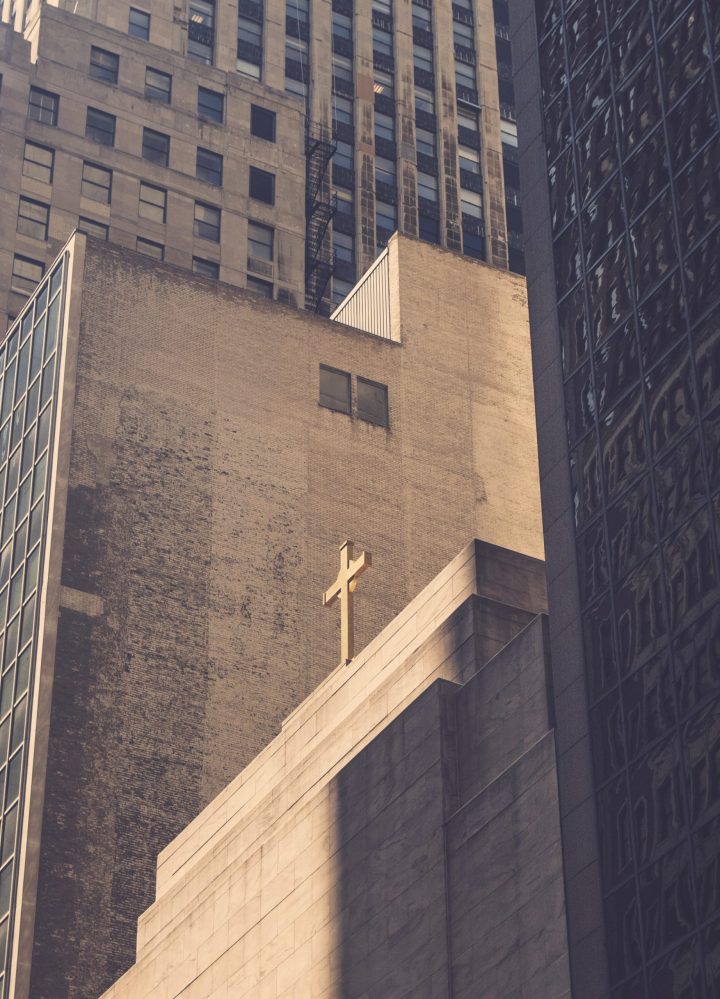
I first learned of Pope Benedict XVI, then Cardinal Ratzinger, from his former student, Father Joseph Fessio, SJ, during lectures he gave at two Catholic conferences at the University of Notre Dame. I remember Father Fessio describing Cardinal Ratzinger as a brilliant yet humble man who was always kind, a great help to Pope Saint John Paul II, and resolutely dedicated to teaching the truth of the Catholic Faith. He explained and defended the Church’s teachings amidst confusion by leading the committee that wrote the Catechism of the Catholic Church and through his work as Prefect of the Congregation for the Doctrine of Faith. I began to pray for him, and he became part of my family in the Church. When Saint John Paul II died, I prayed that Cardinal Ratzinger would be our next Pope, and I thank God that he was.
At his homily the day before being elected, Cardinal Ratzinger named and condemned the tyranny of relativism. He preached:
Today, having a clear faith based on the Creed of the Church is often labeled as fundamentalism. Whereas relativism, that is, letting oneself be ‘tossed here and there, carried about by every wind of doctrine,’ seems the only attitude that can cope with modern times. We are building a dictatorship of relativism that does not recognize anything as definitive and whose ultimate goal consists solely of one’s own ego and desires.
We, however, have a different goal: the Son of God, the true man. He is the measure of true humanism. An ‘adult’ faith is not a faith that follows the trends of fashion and the latest novelty; a mature adult faith is deeply rooted in friendship with Christ. It is this friendship that opens us up to all that is good and gives us a criterion by which to distinguish the true from the false, and deceit from truth.
We must develop this adult faith; we must guide the flock of Christ to this faith. And it is this faith – only faith – that creates unity and is fulfilled in love.”
As a theologian and as Pope, he showed us that truth exists, does not change, and is found in Jesus.
From the beginning of his papacy, Pope Benedict emphasized that he would not be pursuing his own vision for the Church but would strive to enact God’s vision. In the homily for the Mass for the Inauguration of the Pontificate, he said: “My real programme of governance is not to do my own will, not to pursue my own ideas, but to listen, together with the whole Church, to the word and the will of the Lord, to be guided by Him, so that He himself will lead the Church at this hour of our history” (Ratzinger, 2005).
Pope Benedict was not afraid to share his weaknesses and limitations. He felt the difficulty of becoming Pope as an older person with health problems. He was not physically strong; he was not comfortable with large crowds or with being the focus of attention. He also knew the great challenges he would experience in a world that is hostile to Christianity. He relied on God to give him the strength needed and on us to support him with our prayers. I will always remember his humble request at his Inaugural Mass:
My dear friends – at this moment I can only say: pray for me, that I may learn to love the Lord more and more. Pray for me, that I may learn to love his flock more and more – in other words, you, the holy Church, each one of you and all of you together. Pray for me, that I may not flee for fear of the wolves. Let us pray for one another, that the Lord will carry us and that we will learn to carry one another.”
We needed him as our Holy Father, and he needed us to help him in his mission.
The way Pope Benedict lived his vocation as a priest is a great example to all of us in living our vocations. He wanted to serve God as a professor and theologian, write books, spend time with his brother, and remain in Germany. Instead, he was appointed first as a bishop, then as Precept of the Congregation for the Doctrine of the Faith, and finally as Pope. Never able to return to Germany, he was willing to sacrifice what he wanted for his life in order to do God’s will and help the members of the Church. God gave him many great gifts, especially his faith and intelligence, and he made an offering of these gifts by using them in His service.
As a Cardinal and as Pope, Pope Benedict was misunderstood, judged, and harshly criticized by the secular media and even by Catholics who do not believe all the Church teaches. They saw him as an obstacle to their efforts to persuade Catholics to “modernize” by accepting the world’s values. Despite attacks, he continued to teach the truth with courage.
Pope Benedict was a prolific writer. His Spirit of the Liturgy explains the Mass; Called to Communion focuses on the Church; God is Near Us on the Eucharist; Milestones compose his memoirs; Jesus of Nazareth: Holy Week; the collections of his Wednesday audiences on the saints; and his interview books with Peter Seewald: Salt of the Earth, God and the World, Light of the World, and Last Testament.
Pope Benedict’s first encyclical, God is Love, is a beautiful document proclaiming the Church’s teachings on love. He first discusses the meaning of love and then its practice in the Church. He shows the connection between God’s love for us and our love for our neighbor. He wrote:
“Love of God and love of neighbour are thus inseparable, they form a single commandment. But both live from the love of God who has loved us first. No longer is it a question, then, of a “commandment” imposed from without and calling for the impossible, but rather of a freely-bestowed experience of love from within, a love which by its very nature must then be shared with others.”
Pope Benedict’s second encyclical, Saved in Hope presents the Church’s teachings on hope in God for eternal life. He provides a theology of suffering, explaining the benefits of offering up our suffering and the need to pray for the souls in purgatory.
I would have loved to have met Pope Benedict or to have seen him in person, but I never did. I wrote him a few times to thank him for his service to the Church and to let him know I was praying for him. In one letter I told him about the Catholic young adult group I was part of, and he sent me an apostolic blessing for the group. Soon afterwards, the group grew in its number of members.
I felt sad and disappointed when Pope Benedict resigned, but I accepted his decision. I believe he made it after much prayer and did what he thought was right for the Church. His honesty about the challenges to his ministry caused by age and illness gave me a greater understanding of the difficulties experienced by senior priests.
During his time as Pope Emeritus, Pope Benedict was an example of how to live a holy life in retirement. During his time in the monastery, he was dedicated to prayer and thus helped the Church in the most important way we can.
Pope Benedict was a wonderful spiritual father to us. He always encouraged Catholics to remain faithful, close to Jesus, and to not be conformed to the world. He helped us realize that God will give us the grace we need to live holy lives and become saints. He showed us that it is only in Jesus that we can find peace, and that we will have great joy in having a relationship with Him. Pope Benedict has many spiritual children who will always pray for him, share his teachings, and strive to follow his holy example. His greatest legacy is not only his written works, but also all the people he formed and helped to become faithful Catholics by his prayers, writings, and example.
After his death, the pope left us one more commission: “Stand firm in the faith! Do not let yourselves be confused! … Jesus Christ is truly the way, the truth and the life – and the Church, with all its insufficiencies, is truly His body” (Brockhaus, 2022). Pope Benedict lived protecting the Church and died serving her. Now, I believe he is united with Christ, the source of peace, truth, and life, so let us remember this great pope today and ask him to pray for us.
Pope Benedict XVI in Zagreb, June 2011 [photo]. (2011, June 5). The Catholic News Agency of the Bishops’ Conference of Bosnia and Herzegovina. Retrieved from Wikimedia Commons. https://commons.wikimedia.org/w/index.php?search=pope+benedict+xvi&title=Special:MediaSearch&go=Go&type=image.
Ratzinger, J. (2005, April 18). Homily of His Eminence Card: Joseph Ratzinger Dean of the College of Cardinals. Capella Papale. https://www.vatican.va/gpII/documents/homily-pro-eligendo-pontifice_20050418_en.html.
Ratzinger, J. (2005, April 24). Homily of His Holiness Benedict XVI. The Holy See. https://www.vatican.va/content/benedict-xvi/en/homilies/2005/documents/hf_ben-xvi_hom_20050424_inizio-pontificato.html.
Benedict XVI. (2005, December 25). Deus Caritas Est. The Holy See. https://www.vatican.va/content/benedict-xvi/en/encyclicals/documents/hf_ben-xvi_enc_20051225_deus-caritas-est.html.
Brockhaus, H. (2022, December 31). Full Text: Benedict XVI shares his final thoughts with the Church. CNA. https://www.catholicnewsagency.com/news/253202/full-text-of-benedict-xvis-spiritual-testament.



